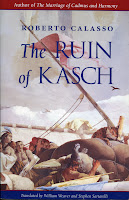In the movie
The Night of the Hunter, the evil preacher has "love" tattooed on the knuckles of one hand and "hate" on the other. It's a prop he uses in his sermons about the struggle between good and evil.
In this chapter of
Cold Mountain, we have two contrasting stories: one is a prisoner's story of his capture and the killing of his father and friends, the other is Monroe's story of how he came to marry Ada's mother. You could say the prisoner's story is one of hate; and it's contrasted with Monroe's story of love.
The violence in the prisoner's story meets today's "entertainment" standards of brutal, graphic violence mixed with indifference, and the prisoner ends by declaring, "This world won't stand long, . . . God won't let it stand this way long."
Enough said.
There's a transition from the prisoner's story to Monroe's. It has to do with a fanciful tale Ruby's father frequently told her, saying it was what her mother had told him --- that he wasn't really Ruby's father, but that she had gotten pregnant by a blue heron. The story, a variation on Leda and the Swan, confirms Ruby's status as a child of nature, but it also sets Ada thinking:
Ruby's fanciful heron story of source and root reminded Ada of a story Monroe had told not long before his death. It concerned the manner in which he had wooed her mother . . .
The story of Monroe's "wooing" is very simple in outline. He falls in love with Ada's mother, Claire Dechutes, at first sight; but just as he is bringing her an engagment ring, he discovers her kissing another man. Monroe rides away in no particular direction--- the "humiliationg role of the betrayed suiter was not one I relished playing," he says. When he and his horse are totally exhausted, he reluctantly decides to "head home," considering the only alternative other than to "act fully the wildman and set a course west to lose myself in the trackless territories of Texas." At this point he sees a fire in the distance, changes his mind and heads toward it, seeing it as "an interim direction."
The fire's source is a church burning. He and a passing drunk make a feeble effort to keeping the church for burning down and fail, but Monroe has decided on a vocation. He soon learns that Claire has married her Frenchman and moved to France. In turn, Monroe goes into the ministry "with both resignation and glee."
Nineteen years pass. Claire returns from France, after the death of her husband, and Monroe courts her again. This time he succeeds and learns that her first marriage was a bitter one. Claire dies giving birth to Ada, and Monroe concludes by telling Ada, "When I rose again [from his grief], it was with the determination that my life was now at your service."
Ada is so taken aback she doesn't know what to say. Since her parents married so late in life, she had always assumed "it an alliance of calm friendship" and "herself to a product of some sad miscalculation." Hearing her father's story of her "source and root," alters the way Ada sees herself.
"She could not at that moment easily frame herself anew, not as some staid erratum but as the product of passion extended against great odds." [italics are mine]
We are meant to be reminded of the window frames from the initial chapters and Ada's previous confusion in looking at herself in a hall of opposing mirrors. I can also mention that in his
Autobiography, Benjamin Franklin, using a publishing metaphor (remember the world of books?), describes his major mistakes in life as "errata."
Once again we come back to perception: the way people perceive the world, and the way they preceive themselves. On their walk home after hearing the prisoner's story, Ada and Ruby have a long conversation that Frazier sums up like this:
Ada wanted to cast it [the prisoner's story] as exaggeration, but Ruby's conclusion was that it ought to be viewed as truth since it sorted so well with the capabilities of men. They then argued generally for a mile or two as to whether the world might be better viewed as such a place of threat and fear that the only consonant attitude one could maintain was gloom, or whether one should strive for light and cheer even though a dark-fisted hand seemed poised ready to strike at any moment.
One last comment before I stop.
Something else in this chapter harkens back to the image of Inman's thrown hat "at rest black as the shadow of a crow squatted on the ground." Ruby talks about her "great respect for the reviled crow, finding much worthy of emulation in their outlook on life."
I'm sure I'll have more to say about crows and other birds later.




